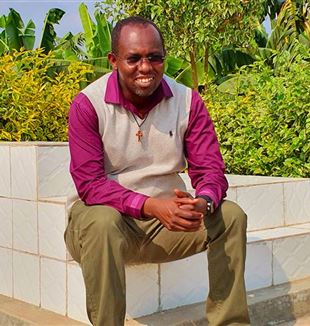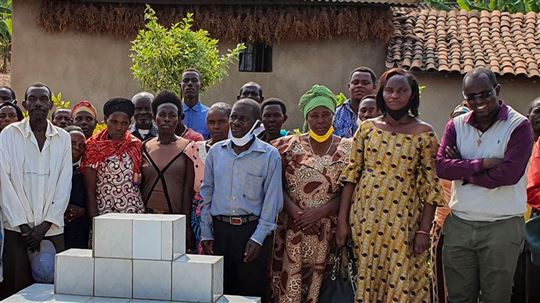
Rwanda: inexplicable freedom
At 14, he lost his parents and siblings in the genocide. Fr. Marcel Uwineza found himself face to face with the man who killed them, who asked to be forgiven. "I stopped being a prisoner.” From the June issue of Tracce.He lost his father, mother, two brothers and a sister. All victims of genocide in Rwanda. Marcel Uwineza at that time, in 1994, was 14 years old. And he remembers everything very clearly. They had not been killed by foreigners, but by people from his village. People he trusted, played with, and even prayed with. "We were killed by our own people." He remembers a Catholic priest whom they had asked for refuge. He replied that there was no room for them, Tutsis. They had to leave. Ten thousand murders a day. A massacre that, in three months, claimed 1 million victims, mainly Tutsis, but also Hutus who refused to participate in mass. Anyone was hunted down. Even pregnant women and psychiatric patients. Killed for the sole reason of belonging to the wrong ethnic group. Marcel and his remaining relatives, at the end of the massacre, returned to the village to give the bodies of his brothers a proper burial. After days of searching, they found the corpses inside a pit. “What broke out within me was a terrible inner war. How could I still live? What would become of me? For three years I did not set foot in a church. Even those who called themselves “men of God” had abandoned us.”
But the story that Marcel was invited to tell at the United Nations General Assembly in New York, on the occasion of the 25th anniversary of the genocide (and which he also recounted at the 2020 New York Encounter), does not end here. That little boy who was orphaned is now a Jesuit priest, dedicating his studies to the topic of forgiveness and reconciliation. His doctoral thesis at Boston College is titled "Reconciling Memories: Theology from a Place of Wounds" and will be published soon. It is an academic study, of course - today he teaches Systematic Theology at the Catholic University of Eastern Africa in Nairobi - but which is rooted in a very specific fact in the life of the young priest: his coming face to face with the murderer of his brothers.
“After the genocide, an uncle of mine returned from Burundi to be close to me and my surviving brothers. He is the person who helped me pick myself up,” says Fr. Marcel. “He is a doctor, an extraordinary man. He belongs to the Focolare movement, imbued with the spirit of that movement that invites the sharing of love and the search for unity." One day he invited Marcel to go to town with his friends. He would have given him money for travel and entertainment. But on one condition: Marcel was to go to mass. Marcel agreed, with no intention of going to church. "How would he have found out that I did go?”, he said, underestimating his uncle. “When he asked me what the day's readings were, I knew I could not get away with it. Thus, in order to continue to see my friends at his expense, I began to attend the Jesuit parish of Kigali." And Marcel was struck by the sermons he heard. So different from those he had heard before the genocide: "They were deep and touched my life and the open wounds of Rwanda. Thus Christianity once again became interesting to me and, after some time, I asked to be allowed to join the Society of Jesus too.”
In 2003, after his years of novitiate, Marcel was called to finish his studies abroad and decided, before leaving, to return to his village to pray at the tombs of his relatives. “I was there, with my eyes closed in concentration. When I reopened them, I saw in front of me the man who had killed my brothers. My blood went cold.” The man, after being arrested, had taken advantage of the Government's offer of releasing those who recognized their guilt and had been assigned to work in public utility services. The village is small and the news of Marcel's arrival immediately reached his ears. “I looked around. It was just him and me. My first feeling was fear that the same thing would happen to me as had happened to my brothers.” But instead of attacking him, the man knelt down: "Marcel, you know who I am and what I did. Is there room in your heart for you to forgive me?” Marcel’s life flashed before his eyes. In those few moments two thoughts crossed his mind: “Even if I do, I will not get my loved ones back. And then: do I have the right to forgive in the name of those who are no longer there?" Yet the young Marcel helped the murderer to get up, looked at him and said: "Yes, I forgive you." It is difficult for him to describe what happened at that moment. The priest speaks of a force greater than himself that seized him and freed him. “I finally felt free. A few minutes later I was in a bar having a beer with that man. Something I never thought I would be able to do.”
Possible? No. Inexplicable. And this is what happened to Fr. Marcel who, to describe him, quotes Jacques Derrida: "Forgiveness forgives only the unforgivable." An experience, he explains, comparable to that of someone who, finding themselves in a closed room without oxygen one step away from passing out, finds the strength to open a window through which new air enters. Or it is like lighting a match in a completely darkened room and re-gaining the sight of the things and people around us. "The ideal is that forgiveness brings together two people who decide to heal a relationship that has broken down. But there are also cases where it is the victim who wishes not to remain a prisoner of the past. It is possible if you recognize that life is greater than what you can have right away. If you do not stop drinking the poison of hatred towards those who have hurt you, wishing their death, you realize that, in reality, you are dying. It is deciding to take a step forward.” But this does not mean closing our eyes to the offense received. And here Fr. Marcel quotes the Protestant theologian Miroslav Volf: "Forgiveness does not mean forgetting, but deciding to remember in a different way."
The story of Fr. Marcel is not an isolated example in Rwanda. Many have decided to follow the path of reconciliation. “But it is not a lightning bolt coming down from a clear, blue sky; it is the result of a journey. This was also the case for me: my relationship with my uncle, my journey of reconnection with faith, my years of novitiate. I was already prepared for the moment I found myself in front of that man on his knees. And we must not judge: every person’s path is personal. Everyone needs their own time and we all need to be accompanied on this journey.”
It is a dynamic that has a value for interpersonal relationships, but also has an impact upon civil coexistence. In Rwanda it is regarded in a particular way. No future without Forgiveness is the title of a famous book by the Anglican archbishop Desmond Tutu, which speaks of South Africa wounded by apartheid. “A society can be rebuilt if it is sustained by truth, justice, but above all by mercy,” explains Fr. Marcel. And mercy, says the beautiful and wise Portia in Shakespeare's Merchant of Venice is "twice blest: it blesseth him that gives and him that takes.”Said in prose: forgiveness restores dignity both to those who receive it and to those who give it. "Errors dehumanize: let us think of the victims of the Holocaust or of our genocide. Dignity is lost for what one suffers and, at the same time, for the atrocity that is committed. Forgiveness restores humanity both to one person and to the other," explains the Jesuit. “God makes the sun shine on the good and the bad. God does not love us because we are good. He loves us because He is God. If He does it without conditions, we too are called to do the same. If we are loved, we are also forgivable. And if we are forgivable, we are in a position to be able to forgive.”
Fr. Marcel returns to that key moment in his life: standing in front of the white stones of his parents' graves. A man on his knees asking for forgiveness. "In that instant, I realized how vulnerable we were both. He bore the wounds of the crime he had committed, I those of hatred for what I had suffered. And the possibility of going back to look ahead opened up before me. Before I told him that I forgave him, I had only a monster in front of me. But when I recognized his vulnerability and the sincerity of his request for forgiveness, that man became a person again. If I had not forgiven, I would have been left with a handful of white stones. And we would not be here talking about it. Forgiveness has turned a challenge into an opportunity. My test turned into testimony. Every time I think about that moment, I remember that energy that was greater than me, which seized me. And I call that energy God.”#forgiveness